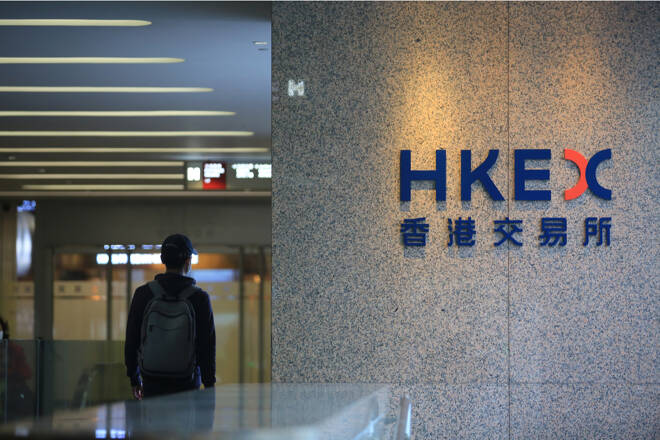Advertisement
Advertisement
Hang Seng Index: Tech Stocks Struggle as Stimulus Lifts Real Estate Sector
By:
Key Points:
- Hang Seng Index falls as tech stocks struggle; real estate sector benefits from recent China stimulus measures.
- ASX 200 rises as mining stocks rally on China’s fiscal stimulus, driving demand for iron ore and boosting investor optimism.
- Nikkei 225 futures rise despite market closure for Health-Sports Day, supported by a stable USD/JPY at the 149 level.
US Equities Enjoy Pre-Holiday Gains
On Friday, October 13, the US Equity Markets reversed their losses from the previous session. US economic indicators supported bets on a 25-basis point November Fed rate cut. The data also bolstered expectations for a soft US economic landing. Corporate earnings added to the gains, with JPMorgan Chase (JPM) and Wells Fargo (WFC) beating estimates.
The Dow rallied by 0.97%, while the Nasdaq Composite Index and the S&P 500 advanced by 0.33% and 0.61%, respectively.
US Economic Data Support Fed Rate Cut Expectations
US producer prices increased by 1.8% year-on-year in September, down from a rise of 1.9% in August. Producers may lower their prices in response to weaker demand, dampening inflationary pressures.
Meanwhile, consumer sentiment softened as the Michigan Consumer Sentiment Index unexpectedly declined. The data bolstered investor hopes for a 25-basis point November Fed rate cut. However, the modest decline aligned with expectations for a soft US economic landing.
Inflation Insights from Experts
AMP Head of Investment Strategy and Chief Economist Shane Oliver commented on the US inflation figures, stating,
“US Sept producer price inflation was benign at 0%mom/1.8%yoy with core at 0.2%mom/2.8%yoy. Together with the CPI it points to Sept core PCE inflation around 0.23%mom/2.6%yoy (down from 2.7%yoy in Aug) which would likely leave the Fed on track for -0.25% in Nov.”
China Stimulus News and Inflation Data in Focus
On Saturday, October 12, China’s Ministry of Finance announced fresh fiscal stimulus measures. However, economists noted the measures lacked sufficient focus on boosting consumer spending and demand.
Economic data from China on October 13 highlighted the need for stimulus measures to boost demand. Producer prices fell by 2.8% year-on-year in September, following a 1.8% decline in August. The sharp fall in producer prices signaled weak demand, raising concerns about whether China can achieve its 5% growth target for 2024.
Hang Seng Index and Mainland China Equities Diverge on Stimulus Sentiment
In Asia, the Hang Seng Index was down 0.23% on Monday morning, recovering from earlier losses. Investor expectations for further stimulus measures from Beijing supported the recovery.
Hong Kong-listed real estate stocks trended higher, with recent stimulus measures likely to support the sector. The Hang Seng Mainland Properties Index (HMPI) advanced by 2.21%. However, tech stocks struggled, with the Hang Seng Tech Index (HSTECH) declining by 1.13%.
Key tech movers included Baidu (9888), which slid by 3.32%, while Alibaba (9988) declined by 0.38%.
In contrast, Mainland China’s equity markets reacted more favorably to Saturday’s MoF press conference. The CSI 300 was up by 1.03%, while the Shanghai Composite gained 1.20%.
ASX 200 Tracks Wall Street Higher
On Monday, the ASX 200 Index advanced by 0.69% during the morning session, led by mining and gold stocks.
Mining giants BHP Ltd. (BHP) and Rio Tinto Ltd. (RIO) rallied by 1.87% and 2.00%, respectively. Iron ore futures were up 1.39% in the morning, driving demand for mining stock. Hopes of China’s stimulus measures bolstering its real estate market drove iron ore futures higher.
Additionally, Northern Star Resources Ltd. (NST) advanced by 2.13%, after a 1.03% gain in gold prices on Friday.
Nikkei Futures Rise as Markets Close for Holiday
Meanwhile, there was no trading on the Nikkei Index, with the Japanese markets closed for the Health-Sports Day holiday. However, the Nikkei 225 futures were up 190 points as the USD/JPY pair held onto the 149 level.
Looking Ahead
Investors should remain alert, focusing on Beijing, the central banks, and the economic calendar. On Monday, trade data from China could provide more insights into China’s economy. Hopes of further stimulus measures from Beijing could limit the impact of weaker imports and exports.
About the Author
Bob Masonauthor
With over 28 years of experience in the financial industry, Bob has worked with various global rating agencies and multinational banks. Currently he is covering currencies, commodities, alternative asset classes and global equities, focusing mostly on European and Asian markets.
Advertisement
